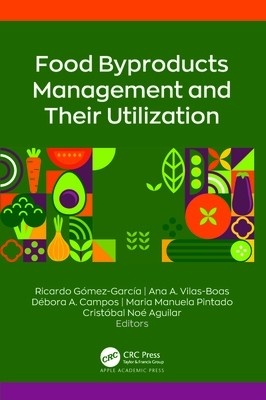
- We will send in 10–14 business days.
- Publisher: Apple Academic Press
- ISBN-10: 1774912953
- ISBN-13: 9781774912959
- Format: 15.6 x 23.4 x 2.9 cm, hardcover
- Language: English
- SAVE -10% with code: EXTRA
Food Byproducts Management and Their Utilization (e-book) (used book) | bookbook.eu
Reviews
Description
Food byproducts derived from industrial processing is a serious worldwide problem because it generates environmental pollution and results in significant food and economic losses from food waste. This new volume shows how food byproducts can be value-added renewable sources with the application of novel biotechnologies that avoid hazardous chemicals.
The volume discusses the importance of valorizing food wastes and illustrates their value-added properties for industry. It explains the significant progress in bioresources processing for compound extraction and production as well as the increasing interest of food ingredients development, in which health care, environment, and economics play an essential part in biotechnological research. It considers the waste byproducts of various crops, such as tomato, melon, maize, berries, soybean, coffee, and their uses in the generation of health-benefiting bioactive compounds. The volume goes on to explore the various biotechnological strategies to extract, produce, and recover bioactive compounds along with the cost-effectiveness of these methods.
Key features:
- Describes technological aspects in consolidated processing and bioprocessing of food by-products
- Discusses technological aspects in biotechnology for food byproducts treatment and the richness of their biomolecules
- Looks at the nutraceutical and health benefit aspects of such biomolecules from food waste byproducts
- Provides attractive and sustainable methodologies for bioproduct extraction and recovery for industrial application
This volume, Food Byproducts Management and Their Utilization, presents strategies that are of interest in food engineering, green chemistry, biotechnology, and some other areas, while paying special attention to biorefinery approaches and new challenges that industries are dealing with in the era of sustainable development. It aims to encourage not only researchers but also governmental and enterprise sectors to recognize the value and applications of food byproducts and waste.
EXTRA 10 % discount with code: EXTRA
The promotion ends in 19d.22:13:47
The discount code is valid when purchasing from 10 €. Discounts do not stack.
- Publisher: Apple Academic Press
- ISBN-10: 1774912953
- ISBN-13: 9781774912959
- Format: 15.6 x 23.4 x 2.9 cm, hardcover
- Language: English English
Food byproducts derived from industrial processing is a serious worldwide problem because it generates environmental pollution and results in significant food and economic losses from food waste. This new volume shows how food byproducts can be value-added renewable sources with the application of novel biotechnologies that avoid hazardous chemicals.
The volume discusses the importance of valorizing food wastes and illustrates their value-added properties for industry. It explains the significant progress in bioresources processing for compound extraction and production as well as the increasing interest of food ingredients development, in which health care, environment, and economics play an essential part in biotechnological research. It considers the waste byproducts of various crops, such as tomato, melon, maize, berries, soybean, coffee, and their uses in the generation of health-benefiting bioactive compounds. The volume goes on to explore the various biotechnological strategies to extract, produce, and recover bioactive compounds along with the cost-effectiveness of these methods.
Key features:
- Describes technological aspects in consolidated processing and bioprocessing of food by-products
- Discusses technological aspects in biotechnology for food byproducts treatment and the richness of their biomolecules
- Looks at the nutraceutical and health benefit aspects of such biomolecules from food waste byproducts
- Provides attractive and sustainable methodologies for bioproduct extraction and recovery for industrial application
This volume, Food Byproducts Management and Their Utilization, presents strategies that are of interest in food engineering, green chemistry, biotechnology, and some other areas, while paying special attention to biorefinery approaches and new challenges that industries are dealing with in the era of sustainable development. It aims to encourage not only researchers but also governmental and enterprise sectors to recognize the value and applications of food byproducts and waste.


Reviews